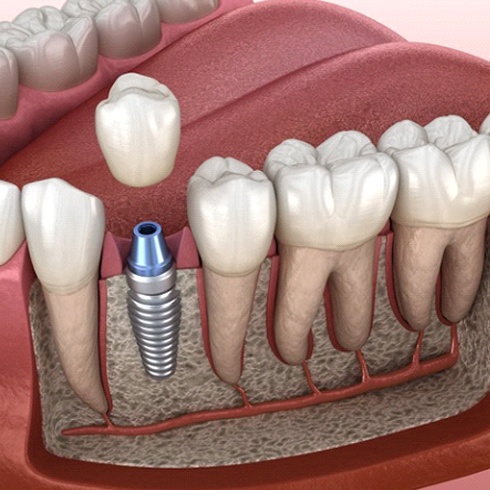Far and away, dental implants are the most successful and longest-lasting tooth replacement available today. That being said, they could still fail. If you’re one of the fewer than 5% of patients who experience dental implant failure, there’s a chance that our dentists here at Meadowbrook Dental Care can save your new smile. Do you suspect you’re dealing with a failed dental implant in Mineola? If so, please call us right away – we’ll get you seen as soon as possible so that we can perform dental implant salvage.
Why Choose Meadowbrook Dental Care for Dental Implant Failure & Salvage?
- Qualified Dentists with Years of Experience
- Dental Team That Puts Patients First
- State-of-the-Art Dental Facility Designed for Comfort
Why Do Dental Implants Fail?
A dental implant could fail for a variety of reasons, the most common of which is an infection in the gums called peri-implantitis. This is actually a form of gum disease, and without treatment, bacteria accumulate and eventually destroy the tissues and weaken the bone that supports the implant. As a result, the implant fails. Peri-implantitis can occur any length of time after getting dental implants, but it’s most often caused by poor oral hygiene.
Other common causes of dental implant failure include:
- Tobacco use
- Injury to the mouth, jaw, or face
- Medical conditions that impair the body’s healing process
- Failed osseointegration (the jawbone fusing to the implant post)
Signs of a Failed Dental Implant
If you’ve gotten dental implants in Mineola fairly recently (as in, within the last year or so), you might not notice if there’s a problem with your replacement teeth. However, our dentists certainly can! After your restoration has been placed atop your implant, then it will be easier for you to tell when something is amiss. You’ll need to schedule an appointment with us immediately if you experience any of the following:
- Swollen, red, or bleeding gums near the implant
- Gum recession around the implant
- Persistent bad breath or foul taste in the mouth
- A feeling that your implants (or other teeth) are loose
- Pain when biting down
- General soreness or discomfort near your implant
How Dental Implant Salvage Works
Treating a failed dental implant first requires that our team identify the underlying problem. If it is attributed to peri-implantitis, periodontal treatment will need to be administered as well as a possible bone graft. While it may not be necessary to remove the implant to perform gum disease care, bone grafting will require that it be removed so that additional grafting materials can be put into place.
Over the next several months, the new and existing bone tissues will integrate and fuse to create a more solid base for the new implant post.
If failed osseointegration is the reason, a new implant can be put into place once a bone graft is performed. Of course, the reason for failed osseointegration may be due to poor lifestyle choices or a systemic disease that requires care by a trusted physician.
Our team will do all that we can to restore your smile with a new dental implant; however, if you have an autoimmune disease or are unwilling to give up a bad habit that hinders the success of your new smile (i.e., smoking), you may need to seek an alternative form of tooth replacement.



